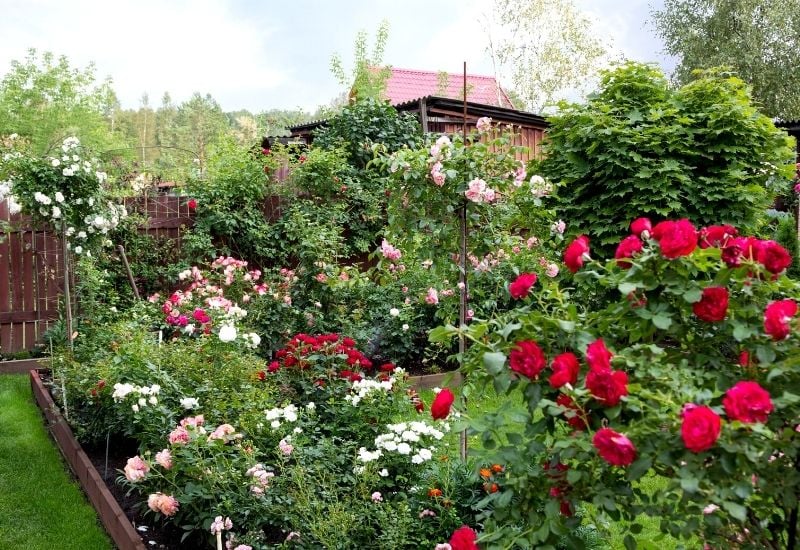
Popular belief has it that roses only grow in full Sun, but some varieties actually tolerate and even thrive some shade. So if your garden does not have lots of sunlight, but you still want to grow these thorny flowers of love, you still can.
Your best bet is to choose a variety that does not mind some dappled shade, light shade or partial shade if you want to be successful. And there are a few…
All roses will thrive in full Sun, which is more than 6 hours of bright light a day. However, some shade tolerant varieties will do surprisingly well with 3 to 6 daily hours of bright light each day. There are roses of all categories, climbers, English, floribunda and hybrid tea, for example.
When planning a rose garden in areas with limited sunlight, the key is to pick the most suitable shade-friendly rose varieties.
To simplify your search, we have rounded up 10 of our favorite shade-loving rose varieties suitable for the growing sunlight starved areas in your garden and how best to care for them.
Yet before we look closely at them, let’s talk a bit about roses, light and shade…
Growing Roses in Shady Places: Heat and Light
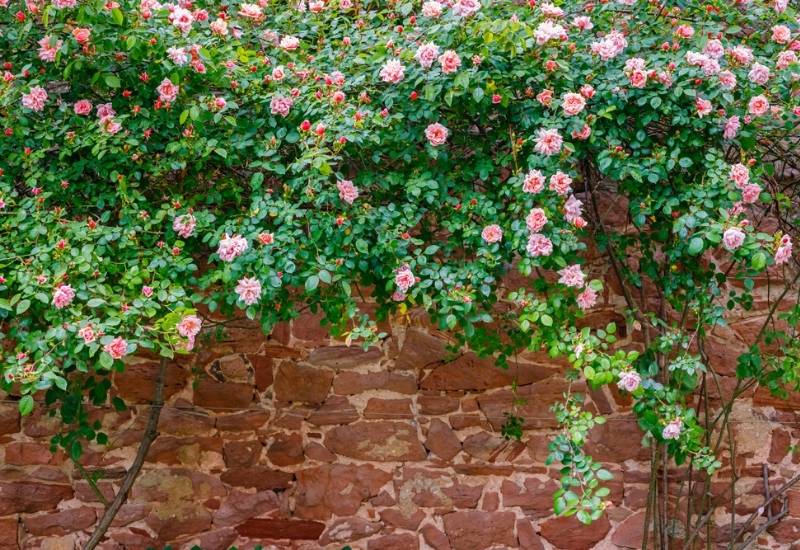
When you read that a rose or any plant is “suitable for partial shade” it can mean many things… Especially with our thorny flowers we need to keep in mind that most roses are not heat tolerant.
Therefore, in many hot countries many roses actually do better in partial shade than full Sun, especially if you give them morning and evening sunlight but you shelter them from the hottest hours.
Where Does Your Garden or Terrace Face?
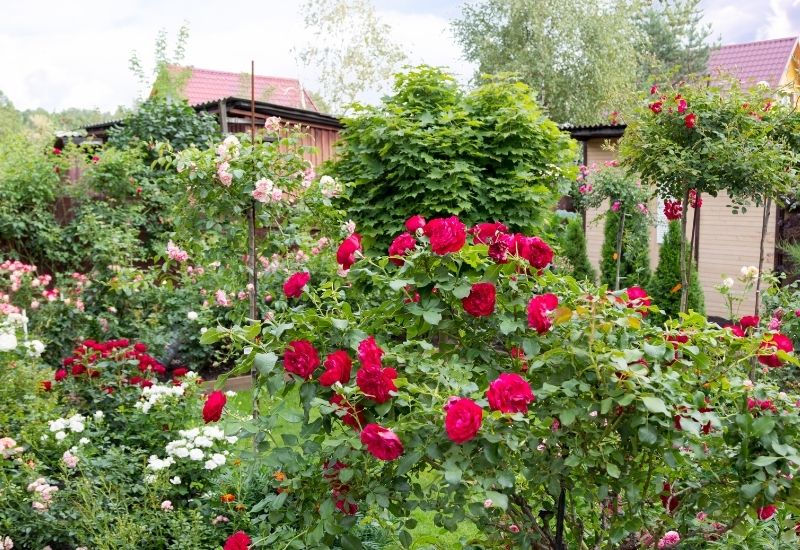
Another point is the direction your garden faces; south and east facing gardens get more light and even heat. West facing gardens a bit less and finally north facing gardens get the least.
That is, if you live in the North Hemisphere, like the USA, Canada, Europe and Asia, but if you live in Australia, South Africa or Argentina then it’s the other way round…
Bright Light vs. Direct Light
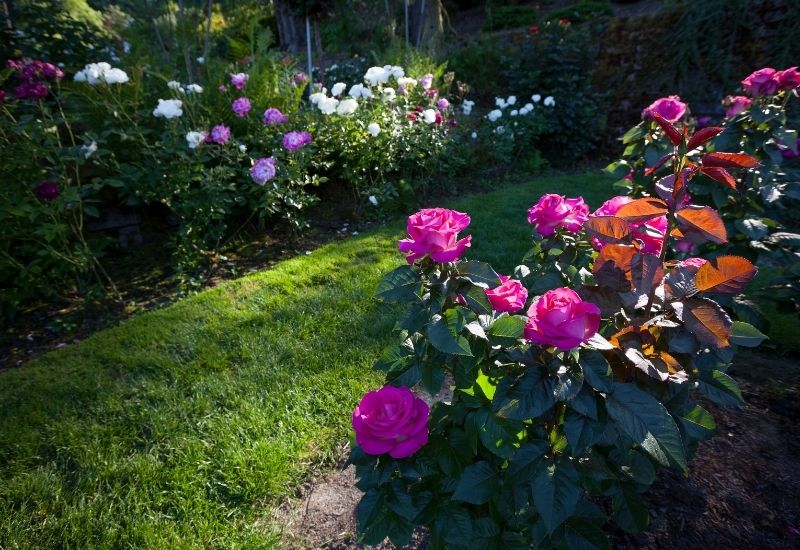
Yet another important note is that bright light does not mean direct light. Technically, anything above about 8,600 lumens is bright light. And what does it mean?
It means that in a sunny day directly in the light, you get 100,000 lumens! Gardeners sometimes still use foot candles for this, and still the idea is that above 800 foot candles you are in bright light, while 10,000 is when you are under a clear sky with our star above your head.
You get the point; many places that don’t receive direct light actually receive bright light, and plenty of it.
Finally, keep in mind how near the Equator you live. Light is stronger near this line, as is the heat, and remember we said that roses prefer fresher conditions.
Extra Care for Roses in Shady Places
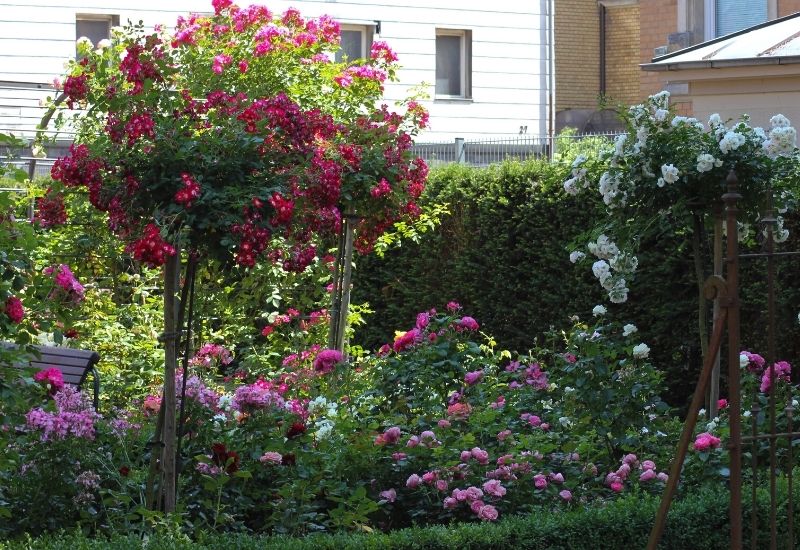
You will look after your roses in partial shade the same way as you do with them in full Sun but… You may want to be a bit more alert about disease, especially fungi.
Rose leaf spot, powdery mildew, cane canker and even rose leaf rust are all fungal infections, and they happen more frequently in humid, less sunny places.
Make sure that ventilation is good, and your flowering shrub will thank you with plenty of flowers. In fact, in some places, like very hot countries, some rose varieties will give better blooms in fresh but ventilated partial shade places than in full Sun.
But now let’s talk a bit about selecting the right rose for you.
Are Some Types of Roses Better for Partial Shade than Others?
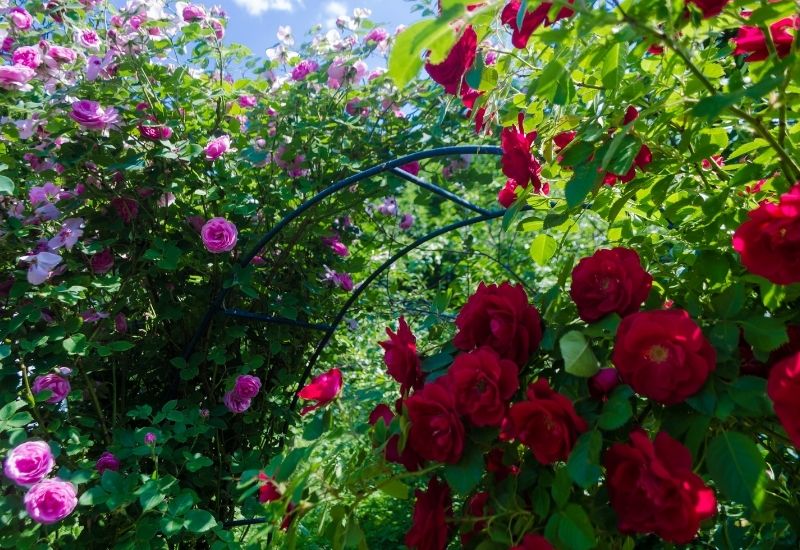
The answer is yes – but… Traditionally, climbing and rambling roses are more suitable for shady places. You will also see many natural species grow where sunlight is not so long.
English roses and hybrid tea roses have historically proven sun lovers instead. Having said this, there has been a lot of progress with English roses that tolerate shady places in recent years thanks to very capable breeders.
And we have chosen roses of different types and looks for your place in the shade, as far as possible, as you will see right now!
10 Roses That Will Grow Well In The Shady Spots Of Your Garden
The best roses for partial shade are the ones that can withstand low light and some dappled sun.
There is an abundance of these varieties, but narrowing down which one will survive in a partially shaded location may prove to be surprisingly difficult- especially when you take into account all those other factors!
Here are 10 standout shade-loving rose varieties that can thrive in areas of your garden with limited sunlight:
1: Rose ‘Paul’s Himalayan Musk’ (Rosa ‘Paul’s Himalayan Musk’)
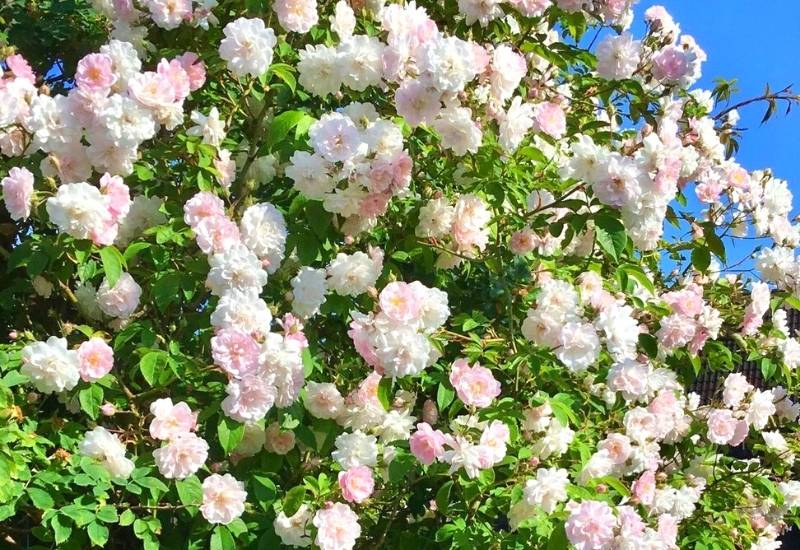
‘Paul’s Himalayan Musk’ is a shade loving giant rambling rose with massive blooms. The blooms are pale pink and double, with a very, very strong fragrance of musk, like wild roses.
It is a delicate looking, light variety that can grow to impressive height, making it one of the largest roses in the world. The branches are very long and flexible, so the blooms dance in the wind.
‘Paul’s Himalayan Musk’ is an heirloom variety from 1876 and it is ideal if you have a large place in partial shade that you want to fill with amazing flowers and a very strong and natural smelling aroma.
2: Rose ‘Princess Alexandra of Kent’ (Rosa ‘Princess Alexandra of Kent’)
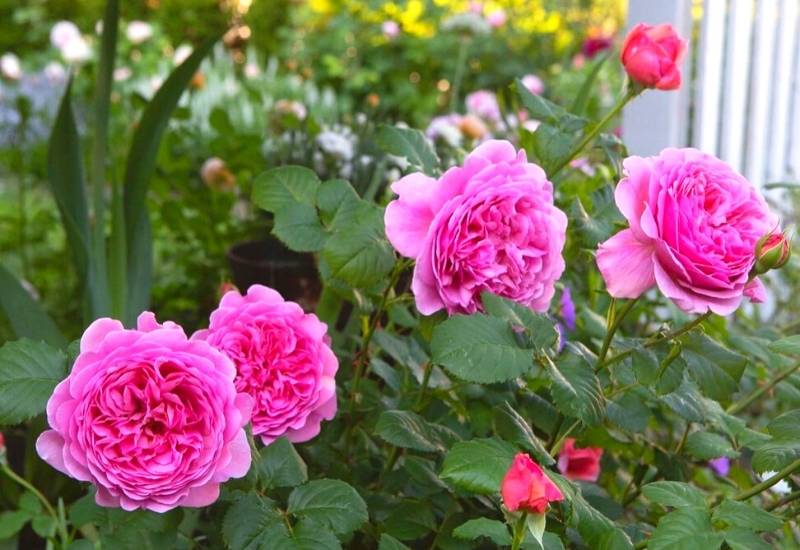
‘Princess Alexandra of Kent’ is a small to medium sized English shrub rose with a very traditional look and it is very shade tolerant. The fully double flowers are bright pink in color and quite large, reaching 4 inches across (10 cm).
They have a strong fresh tea fragrance and they come repeatedly for months. The plant has light green foliage and a very well proportioned round habit.
‘Princess Alexandra of Kent’ is named after a famous gardener with royal blood and it is ideal for smaller spaces, like under your front door porch or on a terrace in partial shade. It is ideal for containers.
3: Rose ‘Hansa’ (Rosa ‘Hansa’)
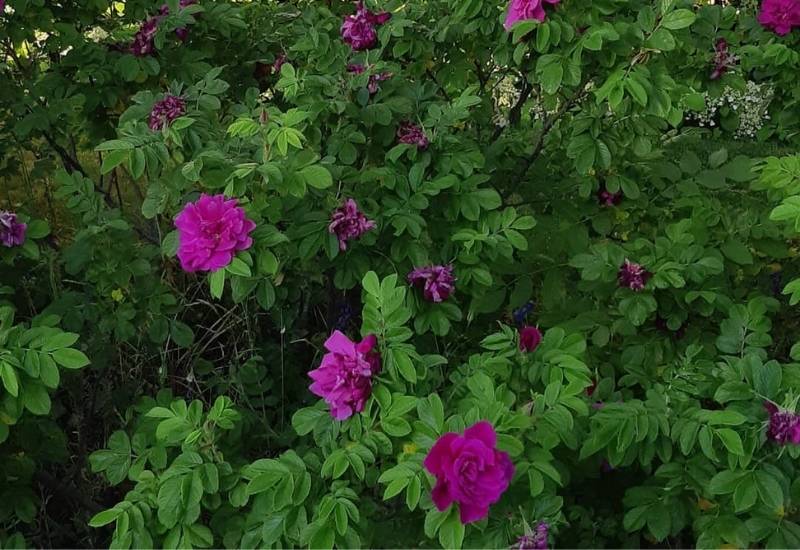
You can even grow a rose from the small rugosa group in your shady garden or terrace, and it’s called ‘Hansa’. Rugosa roses originate from South East Asia and they have wrinkled leaves.
They always have pink to purplish flowers, and ‘Hansa’ has bright, deep magenta fully double blooms of large dimensions, up to 4 inches in diameter (10 cm).
‘Hansa’ is a small but vigorous heirloom variety from 1865; it will adapt to large containers, and it is ideal for natural looking gardens in partial shade. It is also quite cold hardy, so, perfect if you live in a cold place, like Canada.
4: Rose ‘Claire Austin’ (Rosa ‘Claire Austin’)
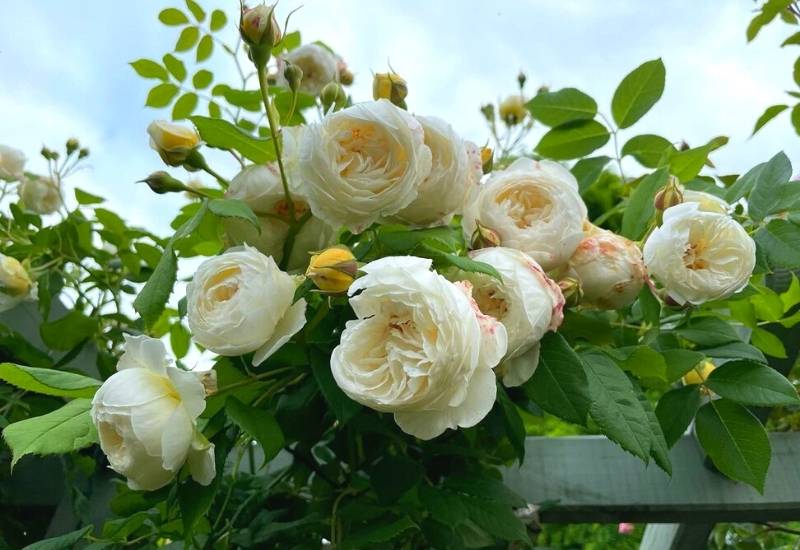
For an English climbing rose to grow in partial or dappled shade, ‘Claire Austin’. It has lovely cream double flowers with cream colored petals arranged in circles that open gradually, forming a perfectly cup shaped bloom. It has a very soft look and a strong fragrance of myrrh.
The foliage is emerald green and healthy; this is a very strong and disease free variety.
‘Claire Austin’ is named after the famous breeder David Austin’s daughter. It is a medium sized climbing rose which can turn a boring wall in partial shade into a soft and fragrant masterpiece.
5: Rose ‘The Lark Ascending’ (Rosa ‘The Lark Ascrnding’)
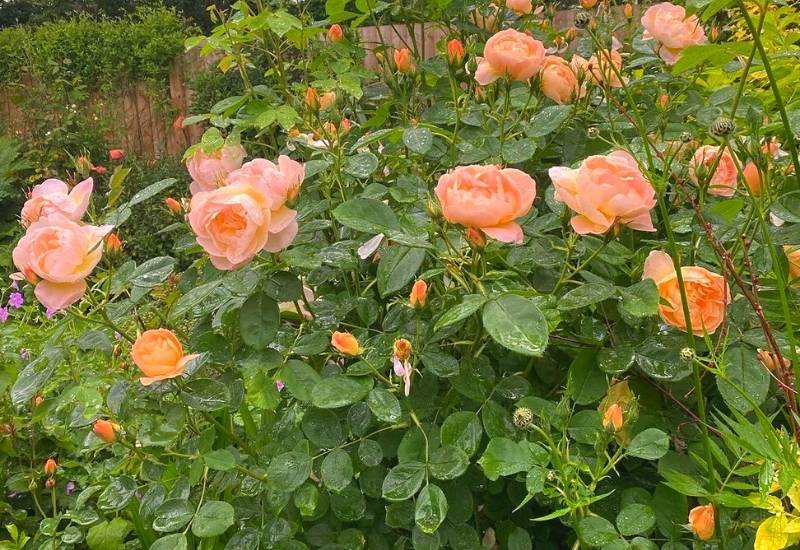
‘The Lark Ascending’ is an English shrub rose that can bring a touch of class and elegance to any shady terrace or garden.
It has cupped and semi double flowers with an apricot to salmon range of shades and a light tea to myrrh aroma. The gold colored stamens complete the bright but sophisticated effect. The shrub is fairly large and vigorous.
This recent variety is a wonder for romantic looking gardens in dappled shade, especially natural looking ones.
6: Rose ‘French Lace’ (Rosa ‘French Lace’)
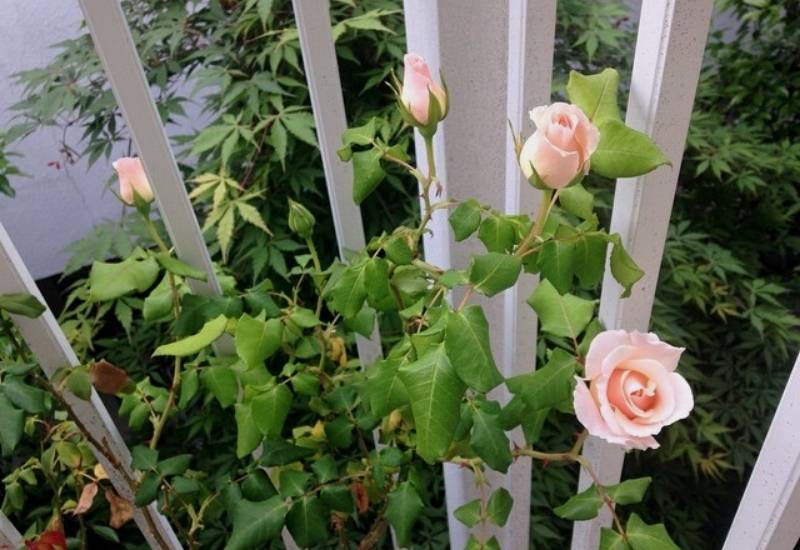
Bring light and candor to your green spot in the shade with a floribunda rose variety from 1981: ‘French Lace’. This beauty has white double flowers with light pastel apricot shades and a bright yellow glow in the center.
Each head is about 3 inches wide (8 cm) and it has a classical tea rose shape. It also has a light fruity fragrance.
This elegant and rose full of light is a winner of the All American Rose Selections Award and a perfect choice for a partial shade spot in full sight, even in formal settings.
7: Rose ‘Garden Unicorn’ (Rosa ‘Garden Unicorn’)
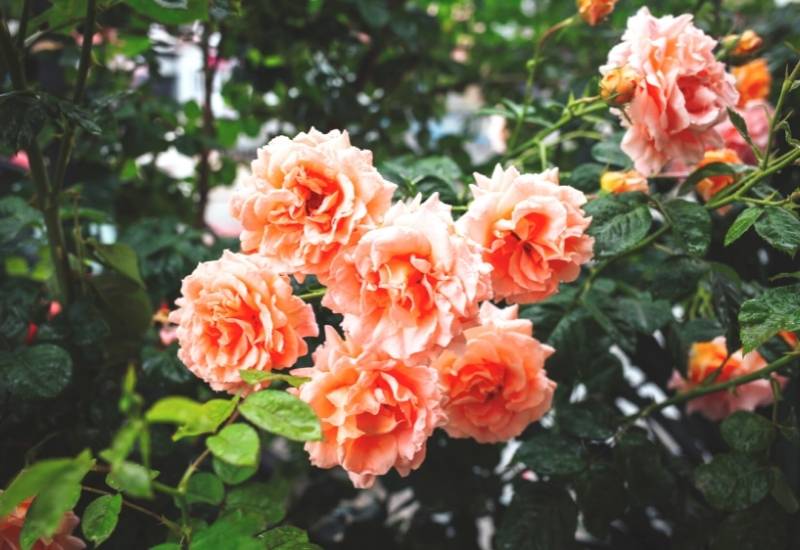
‘Garden Unicorn’ is an old garden rose variety which has a better quality of yellow in partial shade than it does in full Sun! This makes it shade loving rather than tolerant.
It has double blooms that can reach 4 inches across (10 cm), tea shaped and with 15 to 25 petals each. The color is a wonder: it has a base yellow shade with gold, peach and salmon overtones that can even turn to brass.
‘Golden Unicorn’ is a rose with a mysterious origin that can turn your poorly lit garden into a wonderfully original and decorative green space with gold spots all over it.
8: Rose ‘Kew Gardens’ (Rosa ‘Kew Gardens’)
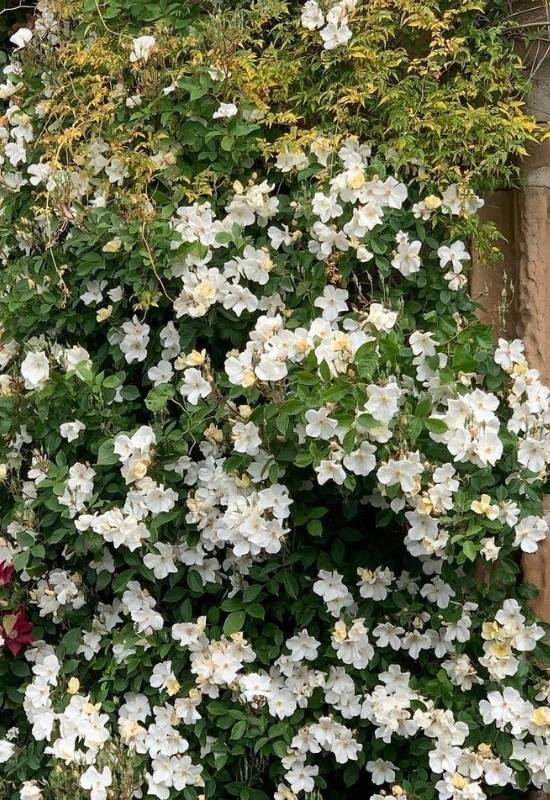
If you want a light and bright single rose with massive blooms in your shady garden or terrace, have a look at ‘Kew Gardens’. The flowers come in large clusters, with perfect white petals with bright yellow dashes at the center and gold pistils.
But when they are in bid, they are apricot in color. These blooms are so vast that ‘Kew Gardens’ has a “hydrangea effect”. The shrub has an upright habit and it is almost thornless.
‘Kew Gardens’ is ideal to bring light in shady spots, thanks to the bright and massive blooms that last for months!
9: Rose ‘Marlvern Hills’ (Rosa ‘Malvern Hills’)
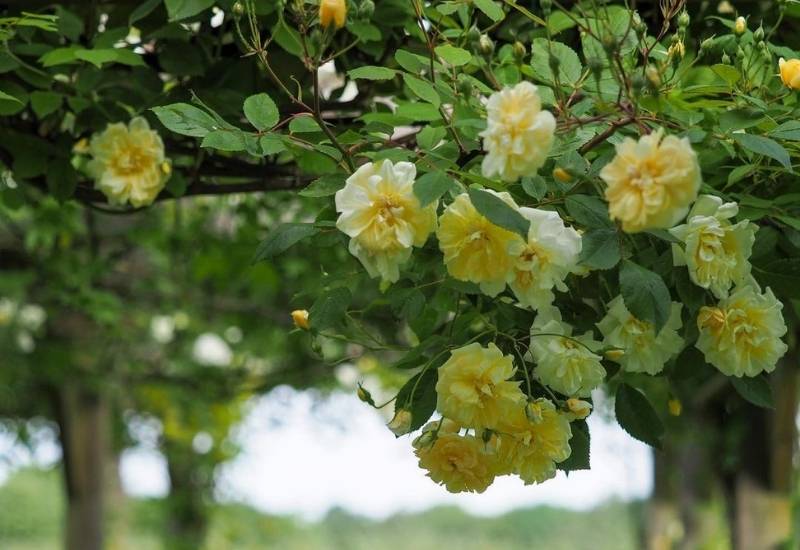
What about a medium sized rambling English rose for that spot that lacks light in your garden? ‘Malvern Hills’ will charm you with its soft yellow blooms that go form cupped to flat rosette shaped as they open.
These are in large and soft looking clusters, with a medium musky fragrance. The leaves are very strong and healthy, and the canes have very few thorns.
This traditional looking rose with an equally natural looking aroma is ideal for informal gardens with shady spots.
10: Rose ‘Ballerina’ (Rosa ‘Ballerina’)
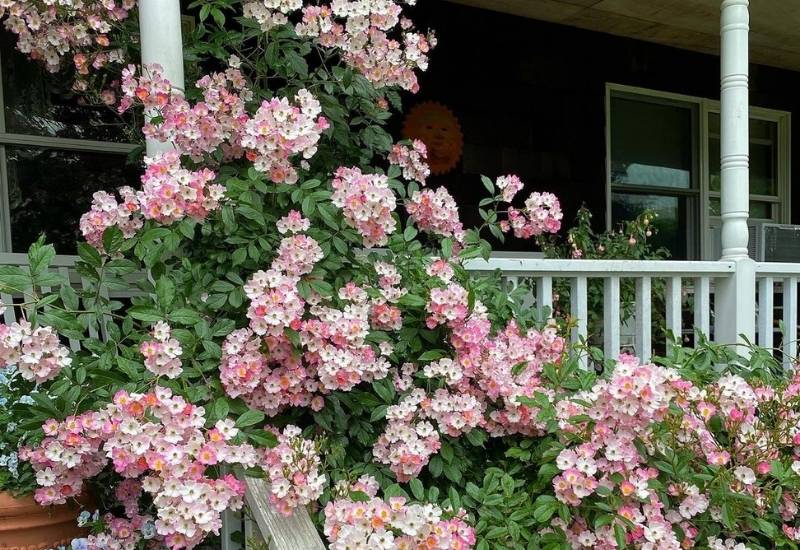
Fill that shady spot in your garden with the massive blooms of hybrid musk rose ‘Ballerina’! The single, classical looking white and pink to magenta flowers with golden centers literally fill the whole shrub all summer, and they keep going even into fall.
It is slightly fragrant too, and the leaves are light green and they add to the bright effect of this record bloomer of the rose world!
‘Ballerina’ is really exceptional in partial shade, filling it with its blooms as if in full Sun. No wonder it has won the Award of Garden Merit by the Royal Horticultural Society!
Light and Colors in Partial Shade with Beautiful Roses!
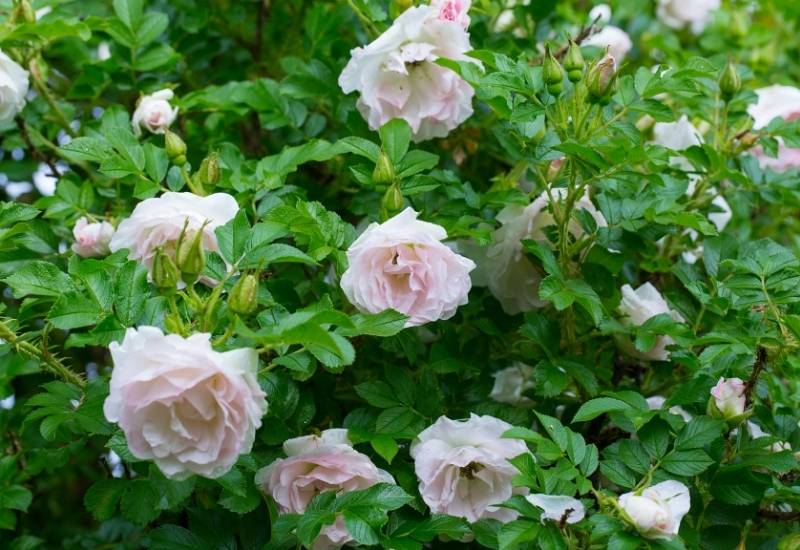
Have I proved you wrong? There are some very beautiful roses that tolerate shady conditions, and we have seen some of the best and most attractive varieties.
There are even some like ‘Garden Unicorn’ that give better results in partial shade than in full Sun!
And now you know that there are roses of different colors, sizes, growing habit, ramblers and bushes, old garden roses, floribunda cultivars, classical English roses and more that you can grow to bring vibrant colors and even fragrance to that sad place in the shade at the back of your garden or terrace…

Written By
Amber Noyes
Amber Noyes was born and raised in a suburban California town, San Mateo. She holds a master’s degree in horticulture from the University of California as well as a BS in Biology from the University of San Francisco. With experience working on an organic farm, water conservation research, farmers’ markets, and plant nursery, she understands what makes plants thrive and how we can better understand the connection between microclimate and plant health. When she’s not on the land, Amber loves informing people of new ideas/things related to gardening, especially organic gardening, houseplants, and growing plants in a small space.

Great article!
What is the light pink rose in the last photo?
Rosa Marchesa Boccella
I’d like to purchase some of the roses but don’t see affiliate links. Can you tell me where you recommend nurseries for healthy plants?
Thank you, what a great article.
Lovely article. Thank you for the information.
You’re very welcome! I’m thrilled to hear that you enjoyed the article and found the information helpful. It’s always a pleasure to provide useful insights and assistance. If you have any more questions or need further guidance, don’t hesitate to reach out. Happy gardening, and may your garden thrive with beauty and abundance!
Great article. Trying to grow roses under large evergreen magnolias…very challenging.
Love this article and so much information to help find the perfect rose for my shady areas. Are any of these roses evergreen? I always wonder about have a blank spot in the yard if all the leaves drop off for winter, if so could I plant something in front of the rose to cover the bare spot. Thank you!